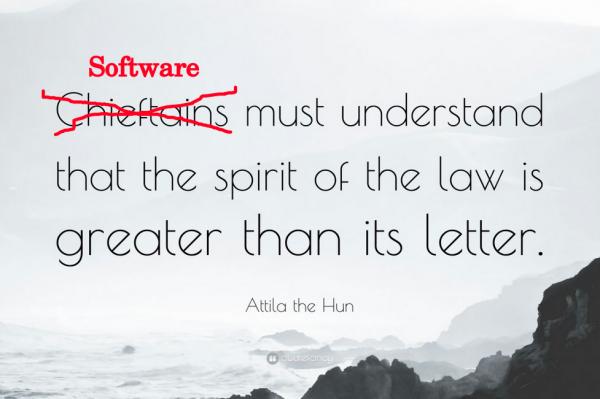Food for thought found on Twitter about "legislation as code"
What would happen if laws were written and maybe even “executed”, that is applied, as if they were computer software code?

Software must understand the SPIRIT of laws, says Attila, Scourge of God. Click for image source
</em></u>
Here is a synthesis of excellent tweets on this topic by Rachel Prosser and others, that I humbly and gratefully post, because I am convinced they should have the greatest possible visibility:
- not all law is susceptible to being programmatically consumed by system: a human judgment as to “what is reasonable” in the circumstances will always be needed.
- fairness/ equity/ efficiency requires some rules are clear and consistently applied - eg how much tax I am due, what my pension is, how much holiday or parental leave I am entitled to. Having a human judge invites bias and favouritism
- if we are to be bound by law, then we should be able to find it and know what it is: making laws programmatically consumable helps immeasurably in this and in giving clarity on entitlements and obligations - and on guiding human judgment on key issues.
- today one brilliant team of @nullary and friends managed to get a year of NZ law on Github, showing it’s possible to get a tool for democratic engagement and effective law - requesting changes which could then be modelled
- law in code can help us model the impact of policy, and make better law that achieves its policy intent.
- But not every judgement should be made by computer: that’s not what we’re suggesting. Absolutely not all law should be programmatically implemented, but all statute law and regulations should be available, free
Related thoughts
- (on the first two points of the previous list):
- Humans should interpret criminal law. Machines computing taxes and eligibility criteria [are fine], as long as humans handle disputes in the end
- Legislation as code… is an area applicable mostly to prescriptive rules like eligibility or calculation rather than areas of justice.
- Legislation as code can tell you with the correct inputs if it’s murder or manslaughter but the computer can’t verify those inputs. That’s the court’s role.
- No computer will tell if the murder was more acceptable, and thus less punishable, because it was in response to years of abuse or to protect someone else’s life. The whole world cannot be defined in a discrete set of inputs.
- (last but not least) Right to trial by jury of your peers is well-engrained in Western democracies, as is the principle that justice must not only be done, it must be seen to be done. I don’t think we’re anywhere near doing away with a human-based court system just yet.
- The actual execution of legislation as code isn’t about legal decisions; it’s about legal comprehension. It makes law’s information digitally native allowing people to build comprehension engines & what-if engines using the authoritative source.
- Having “law-as-code” one can more easily run simulations to get a sense of impact of some law proposals.
- Worry about jurisprudence-in-AI, not legislation-as-code!
(source of Attila’s thumbnail: Wikimedia Commons)
Who writes this, why, and how to help
I am Marco Fioretti, tech writer and aspiring polymath doing human-digital research and popularization.
I do it because YOUR civil rights and the quality of YOUR life depend every year more on how software is used AROUND you.
To this end, I have already shared more than a million words on this blog, without any paywall or user tracking, and am sharing the next million through a newsletter, also without any paywall.
The more direct support I get, the more I can continue to inform for free parents, teachers, decision makers, and everybody else who should know more stuff like this. You can support me with paid subscriptions to my newsletter, donations via PayPal (mfioretti@nexaima.net) or LiberaPay, or in any of the other ways listed here.THANKS for your support!